In the complex landscape of Nigerian politics, loyalty plays a crucial dual role in shaping the welfare of a state. Olumide Olusegun delves into the similarities and impacts of the loyalty exhibited by Rivers State Governor Siminalayi Fubara, his Kogi State counterpart Usman Ododo, and their predecessors.
In Nigerian politics, loyalty is often seen as essential for leadership. The relationship between governors and their predecessors significantly impacts governance, policy continuity, and political dynamics within states.
However, this relationship can sometimes lead to corrupt practices being overlooked, affecting the state’s well-being.
| CLICK TO DOWNLOAD NEWSPAPER |
The recent political drama between Rivers State Governor Siminalayi Fubara, his Kogi State counterpart Usman Ododo, and their predecessors can be seen as a political test of loyalty, with the two governors taking opposite paths.
While Ododo demonstrated loyalty to his immediate predecessor, Yahaya Bello, Fubara is locked in a power struggle with Nyesom Wike over what is being described as a battle for ‘state might’.
A ‘unique’ aspect of both governors is that they were reportedly handpicked and supported by their predecessors before becoming governors.
Their rise to power in their respective states was ‘effortless’ due to the endorsement and backing of their former governors.
Rivers State Conflict:
In a display of loyalty, Fubara, shortly after being sworn in, appointed four of Wike’s loyalists to cabinet positions.
The appointees, who had served in Wike’s cabinet, included Prof. Zacchaeus Adangor (Attorney General and Commissioner for Justice), Isaac Kamalu (Finance), George Des-Kelly (Works), and Prof. Chinedu Mmom (Education), all of whom retained their positions.
However, tensions arose when Fubara allegedly faced restrictions in appointing commissioners and was not allowed to exceed a specific amount of money from the monthly allocations.
This conflict is reportedly rooted in Wike’s desire to maintain control over Rivers State politics and governance even after his tenure ended on May 29, despite now serving as the Minister of the Federal Capital Territory.
Many commissioners in Fubara’s government and several lawmakers were Wike loyalists, leading to ongoing crises.
Fubara recently made a strategic decision effort to assert control over his government by reappointing and deploying Pro-Wike commissioners.
However, five of these reappointed officials have since resigned.
The resignations, defections of PDP lawmakers to APC, the bombing of the State Assembly, and the appointment of a new Speaker are all part of the unfolding drama between Fubara and Wike.
The governor has also accused Wike of financial misappropriation in the handling of state projects, stating that most of the projects during his administration, were not fully funded.
The FCT minister on his part, expressed regrets for supporting his former godson, Fubara to become state governor.
Wike’s selection of Fubara faced opposition from several notable figures within the People’s Democratic Party (PDP) who felt he was unworthy of the position.
Among these prominent figures were Dr. Abiye Sekibo, Senator Lee Maeba, and former Deputy Governor Tele Ikuru.
They argued that Fubara had not significantly contributed to the party and was a political novice compared to them.
Despite their objections, Wike’s influence prevailed, and Fubara not only secured the party’s candidacy but also won the governorship election.
Speaking at a function in Ogu/Bolo Local Government Area of Rivers State, Wike said, “I respect people who appreciate what God has done for them, who appreciate what God has used people to do for them. God does not come down, God uses people to help people.
“So, when you are helped you appreciate them and then God will know that you have also appreciated him. I have never told anybody to worship me, nobody can worship man.
“All of us believe that we only have one God and it is only that God we worship and we will continue to worship that God. But as politicians, you appreciate people who have helped you,”
“I want to say this clearly, in life when you have made a mistake, you say I have made a mistake, there is nothing you can do about it. I have made a mistake, I own it up and I say God forgive me and I will say all of you forgive me, but I will correct it at the appropriate time.
“I am a human being, and I am bound to make mistakes, my judgment can be wrong, so forgive me for making a wrong judgment. That is life, so nobody should kill himself.” Lately, Governor Fubara conveyed his appreciation to Wike for aiding his ascent to governorship but emphasized that he wouldn’t venerate him.
He said, “God can do anything He wants to do when He wants to do it. It is only for us to realise that. God will not come down from Heaven but will pass through one man or woman to achieve His purpose.
“So, for that reason, when we act, we act as humans; human vessels that God has used, and not seeing yourself as God.
“I want to say this clearly that we appreciate the role our leaders, most especially the immediate past governor, played. But that is not enough for me to worship a human being. I can’t do that.”
Recently, Governor Fubara expressed appreciation to Wike for his support in securing the governorship position but emphasised that he wouldn’t idolise him.
The crisis between both governors continued to deeply affect the political climate of the state, with politicians and elders taking sides and engaging in verbal confrontations.
Speaking on the matter, the Convener of the Coalition of Rivers State Leaders of Thought expressed support for the governor’s firm stance.
He added, “When a man stands by his convictions, he should uphold principles of justice.”
Additionally, a member of the Rivers Elders’ Council, Chief Asukewe Iko-Awaji, advised the governor to prioritise his duties. He emphasised that this is a time for governance, not politics.
He warned that failure to deliver the dividends of democracy could pose challenges for the governor’s reelection bid.
Usman Ododo’s Loyalty:
In contrast, Kogi State Governor Usman Ododo has shown unwavering loyalty to his predecessor, Yahaya Bello.
Endorsed by Bello, Ododo emerged as the APC governorship candidate and won the election.
At the APC primary election in Kogi State held on April 14, Ododo, the former Local Government Auditor-General, defeated notable contenders including Smart Adeyemi, the prominent lawmaker representing Kogi West senatorial district, Stephen Ocheni, and Sanusi Ohiere.
Ododo eventually won the governorship election on November 11, 2023, and was sworn in as the 5th Executive Governor of Kogi State on January 27, 2024.
After taking office, Ododo retained nine of the 16 commissioners from Bello’s cabinet and expressed his loyalty to Bello in his inaugural address, describing Bello as his mentor and leader.
He said, “I thank His Excellency, Governor Yahaya Bello, the father of modern Kogi State. Your Excellency sir, words are not sufficient to appreciate the pivotal role you played in the cause of this transition that has formerly taken off. As your governor, I do not take this for granted.
“I want to appreciate my mentor, my leader. I want to appreciate him for training me mentally, for administratively, for training me politically.”
He added, “Kogi State remains your (Bello) Baby. Kogi State needs your attention and care at all times.
“As a student of yours, very committed. I wish to ride on that trajectory. But one thing you should know is that people are calling for my contact, I am giving it alongside your own so that you should know that Kogi State remains your baby.
“Your Excellences, distinguished ladies and gentlemen. I want to sincerely appreciate you and let you know that as His Excellency the president of the Federal Republic of Nigeria, please Yahyah Bello will decode then we will be here to activate.”
Ododo’s loyalty was further demonstrated when he reportedly shielded Bello from an arrest attempt by the Economic and Financial Crimes Commission (EFCC).
The EFCC laid siege to Bello’s residence in Abuja on April 17, 2024, but Ododo, along with security operatives and supporters, allegedly helped Bello evade arrest.
Ododo arrived at Bello’s residence at about 2:30 pm, alongside several security operatives and youth supporters protesting against the siege to the former governor’s home.
A top source in the EFCC confirmed to Channels Television that the embattled former governor was whisked away from his Abuja residence by Ododo.
But the Kogi State Commissioner for Information and Communications, Kingsley Fanwo, denied the allegations, calling them spurious.
He said, “It’s unfortunate that Kogi State is being dragged into this. The accusation by the EFCC is laughable. Were they sure that the former Governor was in his residence? They were not sure that Governor Ododo whisked him away. So, the allegation is false.
What I am saying is that the Governor didn’t whisk him away from anywhere.”
However, many have alluded that the act by the governor is an indication that he is truly loyal to his predecessor.
The governor was also once quoted to have said if he gave a directive contrary to Bello’s, the people should follow that of the former governor.
Reacting, a chieftain of the ruling All Progressives Congress in Kogi State, Isah Ozovehe Abdulbaki, said there is nothing wrong in the governor’s loyalty to his predecessor.
He added, “It is only natural that such a leader who is admired by all in the party is accorded the respect and loyalty. Nonetheless, Yahaya Bello performed excellently as governor of Kogi State in the areas of security, infrastructure, human capital development, and inclusiveness, amongst others.”
Political Analysts react
Speaking in an interview with NATIONAL TELESCOPE, Professor Hassan Saliu of the University of Ilorin and President of the Nigerian Political Science Association (NPSA), described the situation as a political rigmarole, indicating that things could change rapidly in both states.
He noted that most governors work hard to install successors to continue benefiting from state resources.
“Nigerian politicians can be predictable in some ways and unpredictable in others. The current situation in these states might change because politics in Nigeria has become a lucrative business,” he said.
“The main issue in Rivers State revolves around the sharing of resources, both human and material. Resolving this conflict is challenging because it involves maintaining loyalty to the power structure that brought one to office. There’s an attempt to build a supportive structure for the governor, but its effectiveness remains uncertain.”
Professor Saliu added, “Is there any state where an ex-governor installs a successor without expecting loyalty? The idea behind picking a successor is often driven by material benefits. A governor who handpicks a successor does so not out of love for the people but for the continued benefits from the state.”
“Even in the Kogi State scenario, who says things are settled? Anything can happen over a four-year term. The political landscape can shift at any time.”
“How long will Usman Ododo continue with the notion that if his directive conflicts with Yahaya Bello’s, his own should be dropped in favor of Bello’s?”
“In Nigeria, governors wield significant power. They can manipulate situations due to vast resources and low accountability. They are often unaccountable despite existing laws. Once in power, they transform into something else,” he added.
Also, speaking to our correspondent, Professor Makodi Nnia Biereenu-nnabugwu, a political science expert from Nnamdi Azikiwe University, highlighted that the election process which brings a governor to power significantly influences their loyalty.
He stated, “A governor has to meet the expectations of the people. However, the process that brought him to power often dictates where his loyalty lies. If a governor didn’t emerge through a free and fair election, it would be challenging for them to act independently and justly. Such a person is more likely to remain loyal to those who helped them gain power.”
The NPSA vice president added, “The ever-changing dynamics of politics cannot be ignored. The ideal scenario is to have a free and fair election, which would result in a governor committed to the people and able to manage the state effectively.”
When asked about the impact of loyalty on investigating previous administrations, he said,
“It’s unlikely that a governor would probe their predecessor successfully. Politics often involves mutual back-scratching. This political class has a deep understanding of one another.”
 National Telescope national telescope newspaper
National Telescope national telescope newspaper



